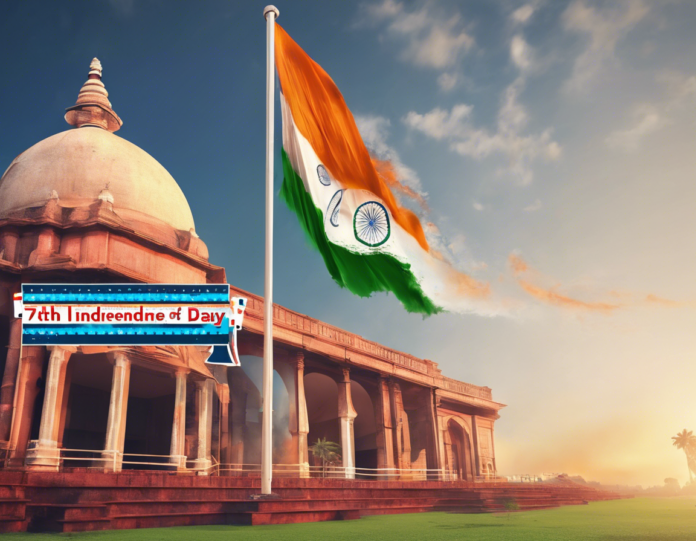As we celebrate our country’s 77th Independence Day, it is an apt time to reflect on the courage and resilience that have defined our nation’s journey towards freedom and development. India’s struggle for independence was marked by countless sacrifices, inspiring leadership, and unwavering determination that ultimately led to the triumph of freedom on August 15, 1947. This significant milestone in our history serves as a reminder of the values that have shaped our nation and continue to guide us towards progress and prosperity.
The Struggle for Independence
India’s fight for independence spanned several decades and encompassed a wide array of movements, protests, and acts of defiance against colonial rule. Leaders like Mahatma Gandhi, Jawaharlal Nehru, Sardar Patel, and many others played pivotal roles in mobilizing the masses and channeling their efforts towards the common goal of liberation. The non-violent resistance spearheaded by Gandhi, through methods such as Satyagraha and civil disobedience, showcased the power of peaceful yet resolute action in the face of oppression.
Courage in the Face of Adversity
The journey towards independence was fraught with challenges and obstacles, including repression by the British, internal divisions, and socio-economic disparities. Despite these adversities, the Indian freedom fighters demonstrated remarkable courage and fortitude, standing up against injustice and tyranny with unwavering resolve. The sacrifices made by countless individuals, from freedom fighters to ordinary citizens, underscored the depth of their commitment to securing a free and sovereign India for future generations.
Resilience and Nation Building
Post-independence, India faced a new set of challenges as it embarked on the path of nation-building and development. The task of rebuilding a nation ravaged by years of colonial exploitation and division required resilience, innovation, and collective effort. The framers of the Indian Constitution, led by Dr. B.R. Ambedkar, crafted a visionary document that laid the foundation for a democratic and inclusive society, reflecting the values of justice, liberty, equality, and fraternity.
Economic Progress and Innovation
Over the decades, India has made significant strides in various sectors, including technology, agriculture, healthcare, and education. The country’s prowess in information technology and pharmaceuticals, among others, has earned global recognition and positioned India as a key player in the global economy. The spirit of entrepreneurship and innovation has driven advancements in diverse fields, fostering a culture of creativity and excellence that continues to propel India forward.
Diversity and Unity
One of India’s greatest strengths lies in its rich cultural heritage and diversity. The country’s vibrant tapestry of languages, religions, traditions, and customs reflects a mosaic of identities united under the common banner of Indianness. This unique blend of diversity and unity has been a source of resilience and dynamism, enriching the fabric of Indian society and serving as a beacon of tolerance and inclusivity for the world.
Looking to the Future
As we commemorate the 77th Independence Day, it is essential to look to the future with a sense of optimism and purpose. The challenges facing India today, from poverty and inequality to environmental degradation and global pandemics, require collective action and innovative solutions. By drawing inspiration from the courage and resilience of our forebearers, we can surmount these challenges and continue on the path towards a more prosperous, just, and sustainable India.
Frequently Asked Questions (FAQs)
1. What is the significance of India’s Independence Day?
India’s Independence Day, celebrated on August 15th, marks the country’s liberation from British colonial rule in 1947. It is a day to commemorate the sacrifices made by freedom fighters and reflect on the values of freedom, democracy, and unity.
2. Who were some of the key leaders in India’s struggle for independence?
Prominent leaders in India’s fight for independence include Mahatma Gandhi, Jawaharlal Nehru, Sardar Patel, Subhas Chandra Bose, Bhagat Singh, and many others who played crucial roles in mobilizing the masses and challenging British rule.
3. What role did non-violent resistance play in India’s independence movement?
Non-violent resistance, championed by Mahatma Gandhi, was a central strategy in India’s struggle for independence. Methods such as Satyagraha (soul force) and civil disobedience were employed to peacefully protest against unjust colonial laws and practices.
4. How has India progressed since gaining independence in 1947?
Since independence, India has made significant advancements in various fields, including technology, healthcare, agriculture, and education. The country’s economic growth, cultural richness, and democratic ethos are testament to its progress over the years.
5. What are some of the challenges facing India today?
India faces challenges such as poverty, inequality, environmental degradation, healthcare access, and infrastructure development. Addressing these issues requires concerted efforts from government, civil society, and the private sector.
6. How does India’s diversity contribute to its strength as a nation?
India’s diversity, encompassing various languages, religions, cultures, and traditions, is a source of strength and resilience. It fosters tolerance, inclusivity, and a sense of unity in diversity that defines the ethos of the nation.
7. How can individuals contribute to India’s development and progress?
Individuals can contribute to India’s development by actively participating in civic engagement, supporting social initiatives, promoting sustainable practices, upholding ethical values, and fostering a spirit of innovation and entrepreneurship in their communities.
8. What role does youth play in shaping India’s future?
The youth of India represent the future leaders and change-makers of the country. Their energy, drive, and vision are instrumental in shaping a progressive and inclusive India, driving social, economic, and technological advancements.
9. How can India uphold the values of freedom and democracy in the face of contemporary challenges?
India can uphold the values of freedom and democracy by strengthening its democratic institutions, safeguarding individual rights, promoting social justice, fostering dialogue and tolerance, and ensuring accountable governance at all levels.
10. What can we learn from India’s independence struggle in facing present-day global challenges?
The lessons from India’s independence struggle, including unity in diversity, non-violent resistance, perseverance, and collective action, can guide us in addressing contemporary global challenges such as climate change, pandemics, social inequality, and political unrest.



